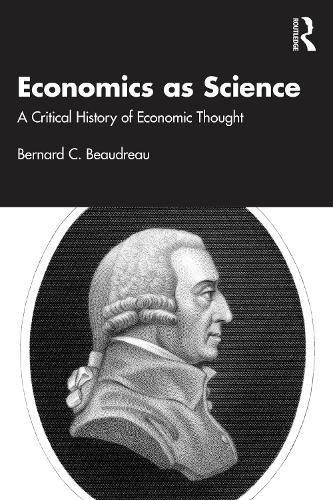Readings Newsletter
Become a Readings Member to make your shopping experience even easier.
Sign in or sign up for free!
You’re not far away from qualifying for FREE standard shipping within Australia
You’ve qualified for FREE standard shipping within Australia
The cart is loading…






This book provides a critical approach to the study of economic thought - from neoclassical economics, to Marxian economics, and to Keynesian economics - through the lens of science and the scientific method.
It examines the collection of ideas that constitute the core of economic thought in the five basic fields of economics: growth theory, income distribution, macroeconomics, price theory and international trade. In each of these, the analysis is chronological, detailing the various events and developments that led scholars to inquire into the underlying mechanics of the phenomena in question. This is followed by a critical examination of the various scholarly contributions, including those of Nobel Prize laureates, in terms of their scientific merit. Each of the five core chapters begins with a listing of chapter objectives and ends with a summary, as well as discussion questions to encourage debate. Short excerpts from the key works are provided to allow the reader first-hand exposure to primary sources.
Reinforcing the idea that economics is a scientific endeavor, Economics as Science: A Critical History of Economic Thought sets out to demonstrate the relevance of the tools and techniques students of economics acquire during their studies in understanding economic phenomena throughout the ages. It will be an invaluable resource for students of the history of economic thought and economics more generally.
$9.00 standard shipping within Australia
FREE standard shipping within Australia for orders over $100.00
Express & International shipping calculated at checkout
This book provides a critical approach to the study of economic thought - from neoclassical economics, to Marxian economics, and to Keynesian economics - through the lens of science and the scientific method.
It examines the collection of ideas that constitute the core of economic thought in the five basic fields of economics: growth theory, income distribution, macroeconomics, price theory and international trade. In each of these, the analysis is chronological, detailing the various events and developments that led scholars to inquire into the underlying mechanics of the phenomena in question. This is followed by a critical examination of the various scholarly contributions, including those of Nobel Prize laureates, in terms of their scientific merit. Each of the five core chapters begins with a listing of chapter objectives and ends with a summary, as well as discussion questions to encourage debate. Short excerpts from the key works are provided to allow the reader first-hand exposure to primary sources.
Reinforcing the idea that economics is a scientific endeavor, Economics as Science: A Critical History of Economic Thought sets out to demonstrate the relevance of the tools and techniques students of economics acquire during their studies in understanding economic phenomena throughout the ages. It will be an invaluable resource for students of the history of economic thought and economics more generally.